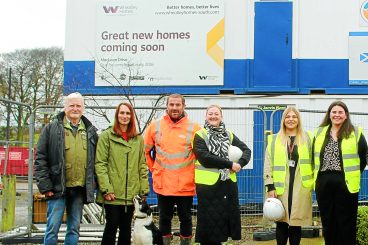A WINDFARM in Upper Nithsdale looks set to be expanded in a move that would supply power to around 13,500 households in Scotland every year.
Sandy Knowe Windfarm, which has been in operation since July 2020, will likely be redeveloped to provide more green energy.
A further six wind turbines – three reaching 125m in height and three at 150m – are in the works for Sandy Knowe.
The proposed development would also involve various other works, including new access tracks, watercourse crossings, the installation of battery storage and infrastructure, underground cabling, use of an existing borrow pit and the re-use of two consented temporary storage compounds.
The windfarm owners ERG UK, who currently have 24 wind turbines on the site, have taken their expansion plans to the Scottish Government.
Dumfries and Galloway Council is now being consulted on the matter, and councillors sitting on next week’s planning committee are being advised by council officers not to raise any objection to the plans.
The original consultation from the Scottish Ministers was received by the council in August 2022, however revised plans have now come forward from ERG UK.
Six notable changes have been made to the plans, including a reduction in the total length of excavated track from 3km to 2.5km, a reduction in the proposed amount of permanent peat extraction by 3000m³, the inclusion of a proposed outdoor education trail which would connect to the existing walking trail and the proposed new access tracks for proposed turbine 30.
A report, due to be tabled at next Wednesday’s planning committee, states: “A revised peat management plan (PMP) has also been submitted which outlines the restoration measures which are proposed to maximise the environmental benefits for peat reinstatement.
“The underlying principles of the outline habitat management plan (OHMP) have been expanded to include landscape planting principles and biodiversity enhancements.
“The applicant has updated the input data used in the Scottish Government’s online carbon calculator to demonstrate the benefits of the proposal, including increases in the amount of CO2 release which would be offset, a reduction in the carbon cost of the development, and other carbon losses, and a reduction to the carbon payback period.
“It is provided that the proposal would generate around 50,000 MWh of electricity per year, and that this is equivalent to 13,500 households in Scotland per year.”
























